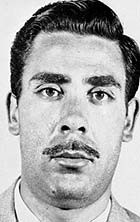
Tommaso Buscetta was an Italian mobster and a member of the Sicilian Mafia. He became one of the first of its members to turn informant and explain the inner workings of the organization.
"Mafia" is an informal term that is used to describe criminal organizations that bear a strong similarity to the Italian Mafia. The central activity of such an organization would be the arbitration of disputes between criminals as well as the organization and enforcement of illicit agreements between criminals through the use of or threat of violence. Mafias often engage in secondary activities such as gambling, loan sharking, drug-trafficking, prostitution, and fraud.
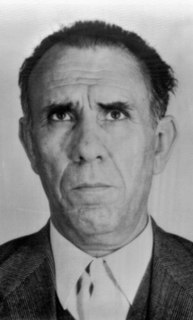
Gaetano Badalamenti was a powerful member of the Sicilian Mafia. Don Tano Badalamenti was the capofamiglia of his hometown Cinisi, Sicily, and headed the Sicilian Mafia Commission in the 1970s. In 1987, he was sentenced in the United States to 45 years in federal prison for being one of the leaders in the so-called "Pizza Connection", a $1.65 billion drug-trafficking ring that used pizzerias as fronts to distribute heroin from 1975 to 1984. He was also sentenced in Italy to life imprisonment in 2002, for the 1978 murder of Peppino Impastato.

Stefano Bontade was a powerful member of the Sicilian Mafia. His actual surname was Bontate. He was the boss of the Santa Maria di Gesù Family in Palermo. He was also known as the Principe di Villagrazia − the area of Palermo he controlled − and Il Falco. He had links with several powerful politicians in Sicily, and with prime minister Giulio Andreotti. In 1981 he was killed by the rival faction within Cosa Nostra, the Corleonesi. His death sparked a brutal Mafia War that left several hundred mafiosi dead.

Salvatore Inzerillo was an Italian member of the Sicilian Mafia, also known as Totuccio. He rose to be a powerful boss of Palermo's Passo di Rigano family. A prolific heroin trafficker, he was killed in May 1981 by the Corleonesi of Totò Riina in the Second Mafia War who opposed the established Palermo Mafia families of which Inzerillo was one of the main proponents.

The Pizza Connection Trial was a criminal trial against the Sicilian and American mafias that took place before the United States District Court for the Southern District of New York in New York City, U.S. The trial centered on a number of independently owned pizza parlor fronts used to distribute drugs, which had imported US$1.65 billion of heroin from Southwest Asia to the United States between 1975 and 1984. The trial lasted from September 30, 1985, to March 2, 1987, ending with 18 convictions, with sentences handed down on June 22, 1987. Lasting about 17 months, it was the longest trial in the judicial history of the United States.

Michele Greco was a member of the Sicilian Mafia and a convicted murderer. Greco died in prison while serving multiple life sentences. His nickname was Il Papa due to his ability to mediate between different Mafia families. Greco was the head of the Sicilian Mafia Commission.
Salvatore "Ciaschiteddu" Greco was a powerful mafioso and boss of the Sicilian Mafia Family in Ciaculli, an outlying suburb of Palermo famous for its citrus fruit groves, where he was born. His nickname was "Ciaschiteddu" or "Cicchiteddu", translated from the Sicilian alternatively as "little bird" or as "wine jug".

Giuseppe "Peppino" Impastato, was an Italian political activist who opposed the Mafia, which ordered his murder in 1978.

Cinisi is a town and a comune in the Metropolitan City of Palermo in Sicily. As of 1 January 2022 it has a population of 11.846.
Cesare Manzella was a traditional Mafia capo, who sat on the first Sicilian Mafia Commission. He was the head of the Mafia family in Cinisi, a small seaside town near the Punta Raisi Airport. As the airport was in their territory it was an invaluable asset for the import and export of contraband, including narcotics. His deputy was Gaetano Badalamenti.
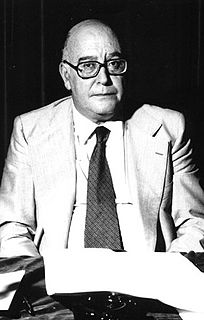
The Sicilian Mafia Commission, known as Commissione or Cupola, is a body of leading Sicilian Mafia members to decide on important questions concerning the actions of, and settling disputes within the Sicilian Mafia or Cosa Nostra. It is composed of representatives of a mandamento that are called capo mandamento or rappresentante. The Commission is not a central government of the Mafia, but a representative mechanism for consultation of independent Mafia families who decide by consensus. "Contrary to the wide-spread image presented by the media, these superordinate bodies of coordination cannot be compared with the executive boards of major legal firms. Their power is intentionally limited [and] it would be entirely wrong to see in the Cosa Nostra a centrally managed, internationally active Mafia holding company," according to criminologist Letizia Paoli.
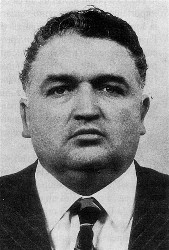
Giuseppe Di Cristina was a powerful mafioso from Riesi in the province of Caltanissetta, Sicily, southern Italy. Di Cristina, nicknamed “la tigre’’, was born into a traditional Mafia family, his father Francesco Di Cristina and his grandfather were men of honour as well.

Giuseppe “Pippo” Calderone was an influential Sicilian mafioso from Catania, eventually becoming the capo of the Catania Mafia family.
The Second Mafia War was a period of conflict involving the Sicilian Mafia, mostly taking place from the late 1970s to the early 1990s and involved thousands of homicides. Sometimes referred to as The Great Mafia War or the Mattanza, it involved the entire Mafia and radically altered the power balance within the organization. In addition to the violence within the Mafia itself, there was violence against the state, including a campaign of deliberate assassinations of judges, prosecutors, detectives, politicians, activists and other ideological enemies. In turn, the war resulted in a major crackdown against the Mafia, helped by the pentiti, Mafiosi who collaborated with the authorities after losing so many friends and relatives to the fighting. In effect, the conflict helped end the secrecy of the Mafia.

I cento passi is an Italian film released in 2000, directed by Marco Tullio Giordana about the life of Peppino Impastato, a left-wing political activist who opposed the Mafia in Sicily. The story takes place in the small town of Cinisi in the province of Palermo, the home town of the Impastato family. One hundred steps was the number of steps it took to get from the Impastato house to the house of the Mafia boss Tano Badalamenti. The film has been released on Regions 2 and 4 DVDs but a Region 1 release has yet to be made.

The Greco Mafia family is historically one of the most influential Mafia clans in Sicily and Calabria, from the late 19th century. The extended family ruled both in Ciaculli and Croceverde Giardini, two south-eastern outskirts of Palermo in the citrus growing area and also rural areas of Calabria where they controlled the olive oil market. Members of the family were important figures in the Sicilian Cosa Nostra and Calabrian 'Ndrangheta. Salvatore "Ciaschiteddu" Greco was the first ‘secretary’ of the Sicilian Mafia Commission, while Michele Greco, also known as The Pope, was one of his successors.
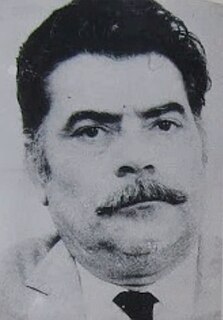
The Interprovincial Commission, also known as "Regione", "commissione regionale" or "cupola regionale") is a governing body of Cosa Nostra. It gathered only to deliberate important decisions about the Cosa Nostra interests between several provinces in the same territory that involved other crime families.

Gaetano Costa was an Italian magistrate killed by the Cosa Nostra.